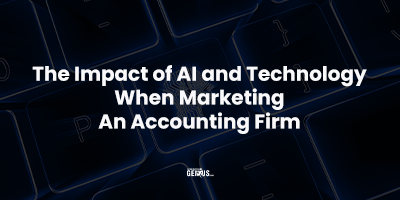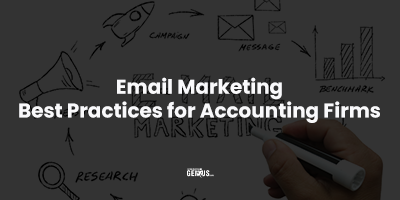Pay-Per-Click (PPC) Advertising for CPA Firms
Is It Worth It? An exploration of the benefits and considerations of using PPC advertising to attract new clients.
1. Introduction
In today's digital era, accountants face fierce competition when it comes to acquiring new clients. Traditional marketing methods may no longer be enough to stand out in the crowd. This is where Pay-Per-Click (PPC) advertising can make a significant impact. By strategically using
online advertising platforms, such as Google Ads, accountants can target potential clients actively searching for their services. This blog explores the benefits and considerations of implementing a PPC strategy for accountants, shedding light on whether PPC advertising is worth it in the world of client acquisition and digital marketing.
2. Understanding Pay-Per-Click (PPC) advertising
To fully grasp the benefits and considerations of using PPC advertising as an accountant, it is crucial to have a clear understanding of how it works. In a PPC model, advertisers pay a fee each time their ad is clicked. This means that your accounting firm will only pay when someone actively engages with your ad.
PPC advertising platforms, such as Google Ads, allow accountants to create targeted ads that appear on relevant search engine results pages (SERPs). By bidding on specific keywords related to your accounting services, you can increase the visibility of your firm to potential clients who are actively searching for those keywords.
With PPC, accountants have control over their advertising budget, as they can set a daily maximum limit on how much they are willing to spend. Additionally, the ability to track and measure the success of PPC campaigns through various metrics, such as impressions, clicks, and conversions, provides valuable insights to optimize your advertising strategy.
However, it is important to note that PPC advertising requires continuous monitoring and optimization. Advertisers must continuously refine their keyword selection, ad copy, and bidding strategies to ensure the best return on investment (ROI).
3. The benefits of using PPC advertising for accountants
PPC advertising offers several advantages for accountants looking to attract new clients. One of the key benefits is the ability to target specific keywords related to your accounting services. By strategically bidding on these keywords, you can ensure that your ads are prominently displayed when potential clients are actively searching for the services you offer.
Furthermore, PPC advertising provides accountants with a level of control over their advertising budget. With the ability to set a daily maximum limit on spending, you can manage your expenses effectively and allocate resources where they will have the greatest impact.
Additionally, the tracking and measuring capabilities of PPC platforms allow you to assess the success of your campaigns. Metrics such as impressions, clicks, and conversions provide valuable insights into the effectiveness of your advertising efforts, enabling you to optimize your strategy and achieve a better return on investment.
4. Considerations before starting a PPC campaign
While PPC advertising offers many benefits for accountants, there are also some important considerations to keep in mind before diving into a PPC campaign. Here are a few key factors to consider:
a. Budget allocation:
It is crucial to establish a realistic budget for your PPC campaign. Consider your overall marketing budget and determine how much you are willing to allocate specifically to PPC advertising. Remember that bidding on highly competitive keywords may require a higher budget to achieve desired results.
b. Keyword research:
Thorough keyword research is essential for any successful PPC campaign. Take the time to identify relevant keywords that potential clients may use when searching for accounting services. This will help you effectively target your audience and maximize the impact of your ads.
c. Ad copy and landing page optimization:
Creating compelling ad copy that highlights your unique services and benefits is vital. Additionally, optimizing your landing pages to align with your ads will improve the overall user experience and increase the likelihood of converting clicks into clients.
d. Continuous monitoring and optimization:
PPC advertising requires ongoing monitoring and optimization to yield the best results. Regularly reviewing and adjusting your campaigns based on performance metrics will help you refine your strategy and improve your return on investment.
By carefully considering these factors, you can make informed decisions and ensure that your PPC campaign delivers the desired results.
5. Maximizing the effectiveness of your PPC campaign
To make the most out of your PPC campaign as an accountant, it is crucial to take steps to maximize its effectiveness. Here are a few strategies to consider:
a. Targeting the right audience:
One of the main advantages of PPC advertising is the ability to target specific demographics and locations. Take advantage of this feature by refining your targeting parameters to reach potential clients who are most likely to be interested in your accounting services. Consider factors such as location, age, income level, and industry to ensure that your ads are reaching the right people.
b. A/B testing:
Conducting A/B tests can help you optimize your PPC campaign by comparing different ad variations to see which one performs better. Test different headlines, ad copy, and calls to action to identify what resonates most with your target audience. This data-driven approach will allow you to make data-backed decisions and improve the effectiveness of your ads.
c. Conversion tracking:
Implementing conversion tracking on your website is essential to measure the success of your PPC campaign. By tracking conversions, you can see which keywords and ads are generating the most leads or sales. This information will enable you to allocate your budget more effectively and focus on the strategies that yield the best results.
d. Remarketing:
Remarketing is a powerful tool that allows you to target users who have already shown interest in your services. By displaying targeted ads to these users across the web, you can stay top of mind and increase the chances of converting them into clients. Set up remarketing campaigns to reach your audience at various stages of the decision-making process, from initial research to consideration and beyond.
By implementing these strategies, you can enhance the effectiveness of your PPC campaign and attract new clients more efficiently.
6. Tracking and measuring the success of your PPC campaign
Tracking and measuring the success of your PPC campaign is crucial to understanding its effectiveness and making informed decisions. By analyzing the data and metrics, you can gain valuable insights into the performance of your ads and optimize your strategy. Here are some key factors to consider:
a. Click-through rate (CTR):
The CTR measures the number of clicks your ads receive divided by the number of impressions. A higher CTR indicates that your ads are appealing to your target audience and generating interest. Analyze the CTR to identify which ads are performing well and which ones may need improvements.
b. Conversion rate:
This metric measures the percentage of users who take the desired action on your website, such as filling out a contact form or making a purchase. A good conversion rate suggests that your ads are effectively driving qualified leads or sales. Monitor your conversion rate to understand which keywords and ads are converting the most successfully.
c. Return on investment (ROI):
Calculating the ROI helps you determine whether your PPC campaign is generating a positive return on your investment. Subtracting the cost of your ads from the revenue generated by those ads and then dividing by the cost can give you an ROI percentage. By analyzing your ROI, you can assess the profitability of your campaign and make necessary adjustments.
d. Cost per acquisition (CPA):
The CPA represents the average cost you incur for each customer acquisition. It is calculated by dividing the total cost of your campaign by the number of new clients acquired. Monitoring your CPA can help you evaluate the cost-effectiveness of your PPC efforts and identify areas where you can optimize your budget allocation.
By regularly tracking and measuring these metrics, you can gain valuable insights into the success of your PPC campaign and make data-driven decisions to improve its performance.
7. Conclusion: Is PPC advertising worth it for accountants?
After exploring the benefits and considerations of using Pay-Per-Click (PPC) advertising to attract new clients as an accountant, it is evident that PPC can be a valuable tool in your marketing strategy.
By tracking and measuring the key metrics such as click-through rate (CTR), conversion rate, return on investment (ROI), and cost per acquisition (CPA), you can gain valuable insights into the effectiveness of your PPC campaign. These metrics provide quantifiable data that can help you make informed decisions and optimize your strategy.
However, it is important to acknowledge that PPC advertising also comes with its challenges. Competitiveness in the digital space can increase costs, and managing campaigns effectively requires continuous monitoring and optimization.
To overcome these challenges and make the most of PPC advertising, it is crucial to stay updated with industry trends and best practices, conduct thorough keyword research, create compelling ad copy, and regularly analyze and optimize your campaigns.
Ultimately, the decision on whether PPC advertising is worth it for your accounting practice will depend on your specific goals, budget, and target audience. By carefully considering the benefits and challenges, and by leveraging the right strategies, PPC advertising has the potential to significantly boost your client acquisition efforts as an accountant.

New Paragraph
Salim Omar
Salim is a straight-talking CPA with 30+ years of entrepreneurial and accounting experience. His professional background includes experience as a former Chief Financial Officer and, for the last twenty-five years, as a serial 7-Figure entrepreneur.

Salim Omar
Salim is a straight-talking CPA with 30+ years of entrepreneurial and accounting experience. His professional background includes experience as a former Chief Financial Officer and, for the last twenty-five years, as a serial 7-Figure entrepreneur.

Salim Omar
Salim is a straight-talking CPA with 30+ years of entrepreneurial and accounting experience. His professional background includes experience as a former Chief Financial Officer and, for the last twenty-five years, as a serial 7-Figure entrepreneur.

Salim Omar
Salim is a straight-talking CPA with 30+ years of entrepreneurial and accounting experience. His professional background includes experience as a former Chief Financial Officer and, for the last twenty-five years, as a serial 7-Figure entrepreneur.

Salim Omar
Salim is a straight-talking CPA with 30+ years of entrepreneurial and accounting experience. His professional background includes experience as a former Chief Financial Officer and, for the last twenty-five years, as a serial 7-Figure entrepreneur.

Salim Omar
Salim is a straight-talking CPA with 30+ years of entrepreneurial and accounting experience. His professional background includes experience as a former Chief Financial Officer and, for the last twenty-five years, as a serial 7-Figure entrepreneur.

Salim Omar
Salim is a straight-talking CPA with 30+ years of entrepreneurial and accounting experience. His professional background includes experience as a former Chief Financial Officer and, for the last twenty-five years, as a serial 7-Figure entrepreneur.

Salim Omar
Salim is a straight-talking CPA with 30+ years of entrepreneurial and accounting experience. His professional background includes experience as a former Chief Financial Officer and, for the last twenty-five years, as a serial 7-Figure entrepreneur.

Salim Omar
Salim is a straight-talking CPA with 30+ years of entrepreneurial and accounting experience. His professional background includes experience as a former Chief Financial Officer and, for the last twenty-five years, as a serial 7-Figure entrepreneur.

Salim Omar
Salim is a straight-talking CPA with 30+ years of entrepreneurial and accounting experience. His professional background includes experience as a former Chief Financial Officer and, for the last twenty-five years, as a serial 7-Figure entrepreneur.












